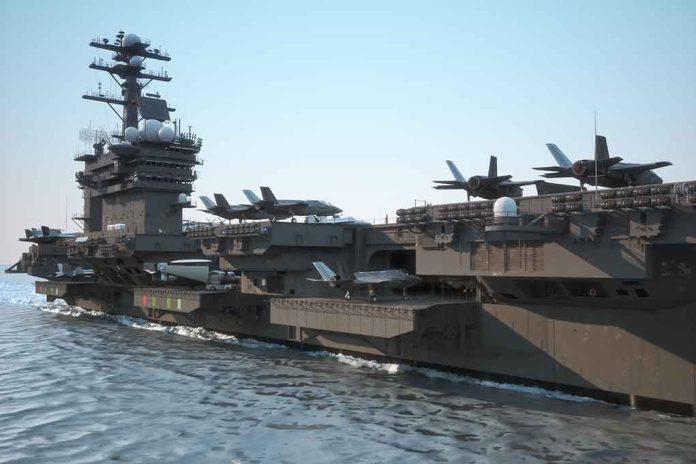🔴 Website 👉 https://u-s-news.com/
Telegram 👉 https://t.me/usnewscom_channel
The EU launches an aggressive new Black Sea strategy to militarize Eastern Europe and counter Russia while expanding its sphere of influence through infrastructure investments designed to support troop movements.
Key Takeaways
- The EU is upgrading infrastructure in Romania and Bulgaria specifically for military use, focusing on ports, railways, and airports to facilitate the transport of heavy military equipment.
- A new Black Sea Maritime Security Hub will serve as an early warning system, protect critical infrastructure, and coordinate demining operations in waters destabilized by the Russia-Ukraine conflict.
- The strategy includes increased monitoring of foreign ownership of key facilities and ports, clearly targeting Russian influence in the region.
- Security analysts estimate a 70-80% likelihood of intensified attacks on Black Sea shipping, with ongoing threats from naval mines and GPS interference.
- The EU is using this security initiative to pull Ukraine, Moldova, Georgia, Turkey, Armenia, and Azerbaijan further into its sphere of influence through infrastructure investments.
EU Military Buildup Disguised as Regional Cooperation
The European Union is ramping up its military presence in Eastern Europe under the guise of a new Maritime Security Strategy for the Black Sea. While presented as a cooperative framework, the strategy’s true purpose is unmistakable – building military-ready infrastructure to counter Russia and expand EU influence eastward. The plan specifically calls for upgrading ports, railways, and airports in Romania and Bulgaria to handle heavy military equipment and troop movements, effectively turning these civilian facilities into dual-use military infrastructure that can support NATO operations.
“Security in the Black Sea is vital also to European security,” said Kaja Kallas, High Representative for Foreign Affairs and Security Policy/Vice-President of the European Commission.
Today, we adopt a new Strategy for the Black Sea – a region of great importance to the EU.
We’re stepping up work on security with:
🔹A new Maritime Security Hub
🔹Improved military mobility
🔹Stronger cooperation against hybrid threatsMy press conference ↓ pic.twitter.com/IrJ5ifeaAL
— Kaja Kallas (@kajakallas) May 28, 2025
New Maritime Security Hub Extends EU Control
Central to this strategy is the establishment of a Black Sea Maritime Security Hub, which will effectively serve as an intelligence gathering and early warning system under EU control. While publicly framed as protection for critical infrastructure and shipping lanes, the hub represents a significant expansion of EU military and surveillance capabilities in Russia’s backyard. The recent targeting of Russia’s Boyko Towers oil platform and increased attacks on shipping in the region provide convenient justification for this military buildup, which goes far beyond standard maritime safety concerns.
“Against a backdrop of Russia breaching airspace, attacking ports and shipping routes, naval mines, front and centre of this work is improving security in the region. We propose a new Maritime Security Hub to strengthen our response, improvements to transport infrastructure to improve military mobility so troops and equipment can be where they are needed, when they are needed,” said Kaja Kallas, High Representative for Foreign Affairs and Security Policy/Vice-President of the European Commission.
Security analysts have raised serious concerns about the volatile situation, estimating a 70-80% likelihood of intensified attacks on Black Sea shipping in the coming months. The presence of naval mines and increasing GPS interference adds to these dangers, creating a pretext for permanent EU military engagement in the region. The EU is clearly using security concerns to justify an expanded military footprint that will remain long after the current conflicts have ended.
Economic Control Through Infrastructure Investment
Beyond the military elements, the EU is cleverly using its “Global Gateway Strategy” to create economic dependencies and expand influence across the Black Sea region. By investing in transport, energy, and digital infrastructure, the EU is creating permanent connections that bind countries like Ukraine, Moldova, Georgia, Armenia, and Azerbaijan to Brussels. This strategy creates EU-dependent infrastructure networks while simultaneously diminishing Russian economic influence in these former Soviet territories.
“We want to develop new energy, transport and digital corridors in the region that will connect us to the Caucasus and Central Asia. Better regional connectivity will create new opportunities for trade and businesses. It will also help diversify energy supplies away from Russia. Both Europe and our partners in the region will be more secure and benefit economically,” said Marta Kos, Commissioner for Enlargement.
Most telling is the EU’s increased monitoring of foreign ownership of ports and key facilities – clearly targeting Russian investments while allowing EU corporate interests to gain control. Commissioner Kos directly acknowledged the geopolitical nature of this strategy, noting that “dependencies are being weaponized” in the region. The EU is essentially fighting Russia’s economic influence by creating its own web of dependencies, dressed up as development assistance and cooperation.
EU Unveils Black Sea Maritime Security Strategy Amid Escalating Threats https://t.co/RgFrDrP9mE
— gCaptain (@gCaptain) May 28, 2025
Expanding EU Integration Under Security Pretext
The strategy’s third pillar reveals the EU’s ultimate goal – expanding its sphere of influence by guiding “interested partners toward EU integration.” This confirms that security concerns are being leveraged to advance the EU’s long-standing agenda of eastward expansion. By requiring alignment with EU policies and strengthening the rule of law along EU standards, Brussels is using this security initiative to prepare countries for eventual membership or deep economic integration, all while presenting itself as merely a benevolent security partner.
“Together we can build a stronger and more prosperous future for all,” claimed Ursula von der Leyen, President of the European Commission, in typical EU diplomatic language that masks the initiative’s true geopolitical nature.
The planned ministerial meeting with partner countries will likely serve as a venue for the EU to advance these integration objectives under the pretense of regional security cooperation. While presented as a collaborative approach, the strategy clearly positions the EU as the central decision-maker and power broker in a region historically within Russia’s sphere of influence. This represents a significant geopolitical push eastward at a time of heightened tensions, using infrastructure and security coordination as the tools for expanding EU control.
⚡️EU announces new Black Sea security strategy to counter Russian threats, top diplomat says.
EU High Representative Kaja Kallas proposed creating a Black Sea Maritime Security Hub, a monitoring system that would protect key infrastructure.https://t.co/kF5z3qqZvi
— The Kyiv Independent (@KyivIndependent) May 28, 2025

